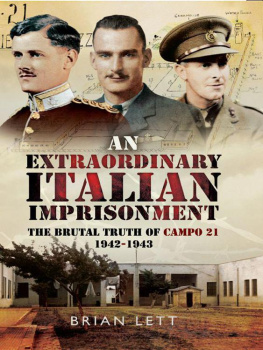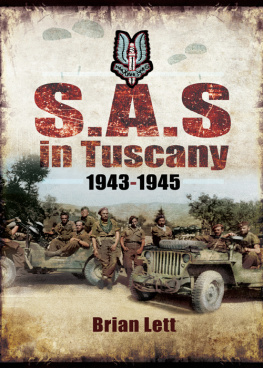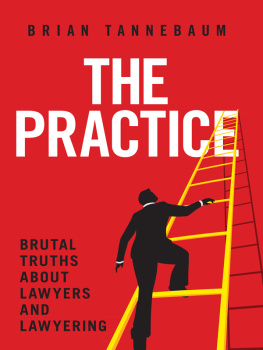Brian Lett - An Extraordinary Italian Imprisonment : The Brutal Truth of Campo 21, 1942-3
Here you can read online Brian Lett - An Extraordinary Italian Imprisonment : The Brutal Truth of Campo 21, 1942-3 full text of the book (entire story) in english for free. Download pdf and epub, get meaning, cover and reviews about this ebook. year: 2014, publisher: Pen and Sword, genre: Non-fiction. Description of the work, (preface) as well as reviews are available. Best literature library LitArk.com created for fans of good reading and offers a wide selection of genres:
Romance novel
Science fiction
Adventure
Detective
Science
History
Home and family
Prose
Art
Politics
Computer
Non-fiction
Religion
Business
Children
Humor
Choose a favorite category and find really read worthwhile books. Enjoy immersion in the world of imagination, feel the emotions of the characters or learn something new for yourself, make an fascinating discovery.
- Book:An Extraordinary Italian Imprisonment : The Brutal Truth of Campo 21, 1942-3
- Author:
- Publisher:Pen and Sword
- Genre:
- Year:2014
- Rating:3 / 5
- Favourites:Add to favourites
- Your mark:
- 60
- 1
- 2
- 3
- 4
- 5
An Extraordinary Italian Imprisonment : The Brutal Truth of Campo 21, 1942-3: summary, description and annotation
We offer to read an annotation, description, summary or preface (depends on what the author of the book "An Extraordinary Italian Imprisonment : The Brutal Truth of Campo 21, 1942-3" wrote himself). If you haven't found the necessary information about the book — write in the comments, we will try to find it.
An Extraordinary Italian Imprisonment : The Brutal Truth of Campo 21, 1942-3 — read online for free the complete book (whole text) full work
Below is the text of the book, divided by pages. System saving the place of the last page read, allows you to conveniently read the book "An Extraordinary Italian Imprisonment : The Brutal Truth of Campo 21, 1942-3" online for free, without having to search again every time where you left off. Put a bookmark, and you can go to the page where you finished reading at any time.
Font size:
Interval:
Bookmark:
An Extraordinary
Italian
Imprisonment
www.brianlettauthor.com
Other books by the same author:
SAS in Tuscany 194345
Ian Fleming and SOEs Operation Postmaster
The Small Scale Raiding Force
An Extraordinary
Italian
Imprisonment
The Brutal Truth of
Campo 21, 19421943
Brian Lett

First published in Great Britain in 2014 by
Pen & Sword Military
an imprint of
Pen & Sword Books Ltd
47 Church Street
Barnsley
South Yorkshire
S70 2AS
Copyright Brian Lett 2014
ISBN 978 1 47382 269 6
The right of Brian Lett to be identified as the Author of this Work has been asserted by him in accordance with the Copyright, Designs and Patents Act 1988.
A CIP catalogue record for this book is available from the British
Library
All rights reserved. No part of this book may be reproduced or
transmitted in any form or by any means, electronic or mechanical
including photocopying, recording or by any information storage and
retrieval system, without permission from the Publisher in writing.
Typeset in Ehrhardt by
Mac Style Ltd, Bridlington, East Yorkshire
Printed and bound in the UK by CPI Group (UK) Ltd, Croydon,
CRO 4YY
Pen & Sword Books Ltd incorporates the imprints of Pen & Sword
Archaeology, Atlas, Aviation, Battleground, Discovery, Family
History, History, Maritime, Military, Naval, Politics, Railways, Select,
Transport, True Crime, and Fiction, Frontline Books, Leo Cooper,
Praetorian Press, Seaforth Publishing and Wharncliffe.
For a complete list of Pen & Sword titles please contact
PEN & SWORD BOOKS LIMITED
47 Church Street, Barnsley, South Yorkshire, S70 2AS, England
E-mail:
Contents

Outline plan of Campo P.G. 21 at Chieti Scalo.
In memory of my father, Major Gordon Lett DSO,
and all those who suffered with him in Campo 21.
List of Illustrations
)
Introduction
I magine: you are imprisoned in a room containing 39 other men. You sleep on one of a pair of wooden bunk beds, with nowhere to put any personal possessions except on a small shelf by your bunk, or in a cardboard box underneath it. You have no privacy. Apart from the three men who occupy the bunks beside, and above or below yours, there is a gap of only 2024in. between your bunk block and the next one on each side, where four more men are trying to sleep. For warmth at night, you have only two sheets, two thin woollen blankets, and what clothing you wear. It is early January, and there is snow on the mountains that tower over your prison compound. You have no warm winter clothes, only shorts and one shirt which are nearly worn out, so during the daytime you wear your blankets in place of a coat. Your shoes or boots have long worn through and your feet are cut, but there are no proper bandages. There is no heater in your room and after dark falls, at about 1630hrs, the electric light is so dim that you cant see to read or write. You have had no hot water to wash in for months and the stench from the lavatories, which do not flush, is appalling. Your diet is monotonous and the food barely adequate.
You have been in this prison for nearly six months. The guards all speak a foreign language and the interpreter is unwilling to translate any of your requests or complaints accurately to the prison governor. There have been no visitors or phone calls from home; any letters that you write never seem to reach your loved ones. Rarely does a letter from them reach you. Your loved ones themselves are threatened by an enemy against whom you can no longer defend them. Your home is far away across the sea and even if you could manage to escape from your prison, you would be in a hostile land, surrounded by enemies. If you were seen trying to escape, you might lawfully be shot dead. You are inyour early twenties, and you are facing a sentence of unknown duration. Life is passing you by.
You are in Campo Prigioneri di Guerra Number 21, at Chieti, Italy. It is January 1943.
This book is intended as a tribute to the many thousands of men, some young, some not so young, who were imprisoned by the enemy during the Second World War. These men had committed no crime, but had been captured while fighting in defence of their country. Today, our society in the United Kingdom marks its disapproval of crime with fixed-term prison sentences of which a prisoner will serve half or less, or, if the crime is extremely serious, with indeterminate life sentences. Prisoners will be well fed, provided with adequate warmth, bedding and clothing, will be allowed family visits, and family contact by post and telephone, and will have access to such luxuries as television.
The lot of a prisoner of war was very different. The sentence was of indeterminate length, since no one knew how long the war would last (or, in the early years, who would win it). Conditions in the camps were often very harsh, with inadequate food, bedding and clothing. In Campo 21, whose story this book tells, shortage of water was an acute problem. No visits from family or friends were allowed, and post was either very much delayed or non-existent. Illness, both physical and mental, was often inadequately treated usually because there were few medicines or medical instruments available. The only crime the prisoners had committed was that of being captured, or worse, of obeying an order to surrender.
Campo 21 was a large camp, containing at various times up to 1,600 prisoners of various nationalities. It was designated for officers, but also held over 200 other ranks who performed the necessary more menial tasks within the camp. A complete cross-section of society was there, all of them entirely at the mercy of their guards. For those who read this book, most of whom, I would guess, have never been arrested and remanded in custody, the story may be diffcult to fully understand. Arrest or capture means the immediate imposition of a total lack of liberty. You no longer have any right to choose where you go or what to do with your life. You must do exactly what you are told at all times. For some of the new arrivals in Campo 21, imprisonment came as a total shock. The starkest of contrasts was for shot down airmen. A few nights before they might have been celebrating in the hotspots of Alexandria, Cairo, or even Londons West End, only to find themselves, abruptly, prisoners in the squalid conditions of Campo21, with the most depressing of future prospects. For pilots and aircrew, who enjoyed the vast freedom of the open sky, imprisonment in a walled camp was purgatory. So, too, for those whose lives before the war had been lived in wide-open spaces such as the Australian outback, many parts of the United States of America, or the moorlands of Britain.
After the retreat to, and evacuation of Dunkirk in May/June 1940, thousands of British troops were taken prisoner. For the vast majority of them, imprisonment would last for five years, the equivalent of a ten-year prison term in modern Britain. I remember well as a young barrister in the 1970s, appearing for the defence before His Honour Judge the Lord Dunboyne at the Inner London Crown Court, knowing that he had been captured at Dunkirk, and had served five years as a prisoner of war. In fact, having himself experienced the pain of incarceration for so long, Lord Dunboyne was far from being an unduly harsh judge.
My own father, Major Gordon Lett DSO, was one of the 35,000 Allied troops captured at the surrender of Tobruk in June 1942. He was 31 years of age when he reached Campo 21 at Chieti, in August 1942. He had been an Acting Lieutenant Colonel when captured at the fall of Tobruk, and had been a regular soldier before the war. In a sense, the danger of being taken as a prisoner of war was part of his full-time profession. However, since progress in his career depended upon rising in rank, time behind the wire was lost career time, and he would now be overtaken by many of his juniors in the hurly-burly of war. Many other prisoners were appreciably younger, and were soldiers for the duration of the war only. They came from all walks of life, some voluntarily, some because they were conscripted. Most had left families behind them, and the vast majority wished only to return to their peacetime professions once the war was won. Some were little more than schoolboys, who in happier times might have been carefree university students, or travelling around the world for a year before taking their degrees. Others were mature married men, who had left wives and children at home. These were the men who had to face life behind the walls and wire of Campo 21.
Next pageFont size:
Interval:
Bookmark:
Similar books «An Extraordinary Italian Imprisonment : The Brutal Truth of Campo 21, 1942-3»
Look at similar books to An Extraordinary Italian Imprisonment : The Brutal Truth of Campo 21, 1942-3. We have selected literature similar in name and meaning in the hope of providing readers with more options to find new, interesting, not yet read works.
Discussion, reviews of the book An Extraordinary Italian Imprisonment : The Brutal Truth of Campo 21, 1942-3 and just readers' own opinions. Leave your comments, write what you think about the work, its meaning or the main characters. Specify what exactly you liked and what you didn't like, and why you think so.












